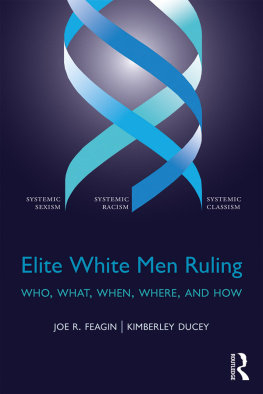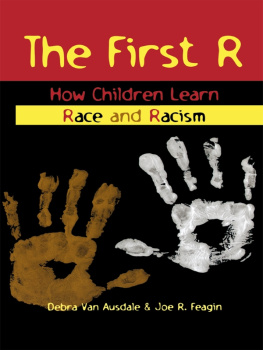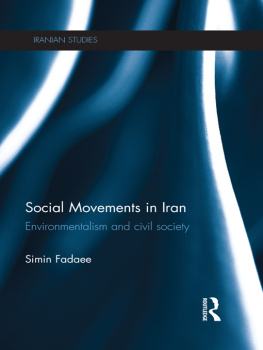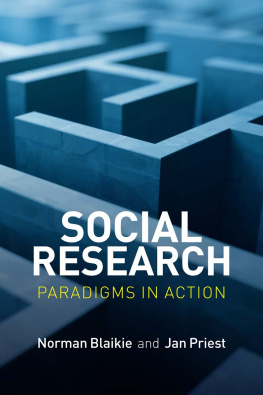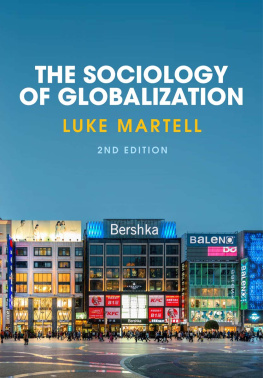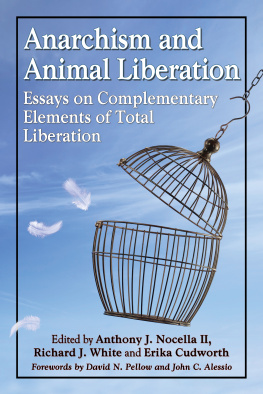First published 2015 by Paradigm Publishers
Published 2016 by Routledge
2 Park Square, Milton Park, Abingdon, Oxon OX14 4RN
711 Third Avenue, New York, NY 10017, USA
Routledge is an imprint of the Taylor & Francis Group, an informa business
Copyright 2015, Taylor & Francis.
All rights reserved. No part of this book may be reprinted or reproduced or utilised in any form or by any electronic, mechanical, or other means, now known or hereafter invented, including photocopying and recording, or in any information storage or retrieval system, without permission in writing from the publishers.
Notice:
Product or corporate names may be trademarks or registered trademarks, and are used only for identification and explanation without intent to infringe.
Library of Congress Cataloging-in-Publication Data
Feagin, Joe R.
Liberation sociology / by Joe R. Feagin, Texas A&M University, Hernn Vera, University of Florida, Kimberley Ducey, University of Winnipeg. 3rd edition.
p. cm.
Includes bibliographical references and index.
ISBN 978-1-61205-724-8 (pbk. : alk. paper) ISBN 978-1-315-63632-0 (ebook)
1. Social justice. 2. Social ethics. 3. SociologyMoral and ethical aspects. 4. SociologyPolitical aspects. 5. Applied sociology. 6. Critical theory. I. Vera, Hernn, 1937 II. Ducey, Kimberley. III. Title.
HM671.F43 2014
303.37dc23
2014012162
Designed and Typeset by Straight Creek Bookmakers.
ISBN 13: 978-1-61205-724-8 (pbk)
ISBN 13: 978-1-61205-723-1 (hbk)
Liberation Sociology has a distinctive history, following developments in liberation-oriented social science as well as the world through three editions. Not long after the first edition of this book, the New York City and Washington, DC, events of September 11, 2001, changed the world in which we live. Soon thereafter, President George W. Bush began aggressive preemptive military invasions against the governments of Afghanistan and Iraq. Rather quickly, the myths of US innocence and moral superiority were no longer tenable in the face of revelations about torture by US soldiers in Iraqi prisons, about rendition episodes in which agencies of the US government secretly moved US prisoners abroad to places where torture was less visible or was politically acceptable, and about the US president and other high-government officials supporting extreme torture tactics banned by international agreements.
One US television network soon began a popular and propagandistic television series called 24, whose plot line usually involved terrorists who, when tortured, at the last minute provided accurate information needed to avert terrible events that would involve many deaths. Under this worst-case scenario set by the television producers, average viewers likely found it hard to think of constitutional alternatives to the aggressive torture applied before their eyes. Yet, these media-contrived events do not reveal that such torture is usually counterproductive, because most people admit to anything under torture. Such programs clearly desensitize the public to the horrors of torture and thereby subvert the protections against totalitarianism theoretically provided by the US constitutional tradition.
Soon after our first edition of this book, a media feeding frenzy was generated by 9/11 and the subsequent Iraqi invasion, and the media often provided the world with haunting images of a sharpened racial divide in the United States. Americans of color, especially those with Middle Eastern backgrounds, were routinely stereotyped and mocked in the mainstream media, discriminated against in the workplace and malls, and violently attacked on the streets. Moreover, travelers within the United States have been constantly reminded that the US government views itself as at war with terrorism when they are forced to dispose of their mouthwash and hand lotion bottles in passing through security searches at airports. Such extreme security measures constantly ensure that the average American will make a personal connection between life in the United States and the military invasions in the Middle East. In addition, offering a rationale of expanding homeland security, numerous governmental officials and private groups have inaugurated a renewed war against undocumented immigrants from Latin American countries, such as in the effort to build tall security fences on the Mexican border. In spite of this xenophobic effort to wall out needed workerswho are in fact economic refugees from countries wherein US corporations play a key role in creating economic crisesfew US citizens see the irony in continuing to brag about the US role in the 1990s destruction of the Berlin wall in Germany and the end of a Soviet political system that routinely blocked and persecuted immigrants.
In the first and second editions, we predicted an increase in the aggressive international posture of a still imperialistic United States. At that time, very few US sociologists had ever systematically examined this US imperialism or colonialism in mainstream sociology publications. This is still the case. We still see few articles in the American Sociological Review and only a few books in the book list in Footnotes, the newsletter of the American Sociological Association, that indicate major research by US sociologists on this countrys continuing overseas invasions and international imperialism. In our view, such social science research is still much needed if this country is ever to achieve its celebrated ideals of liberty and justice for all.
Today, sociology ignites the imagination of countless students who choose to take sociology courses or elect sociology as a major in colleges and universities around the world. Indeed, we, the coauthors, share the experience of having our imaginations ignited when each of us, in separate countries, first encountered sociology in university courses. Joe Feagin decided to become a sociologist after attending his first lectures in sociology at Harvard University. Hernn Vera, at about the same time in Chile, became enamored with sociology when he first read C. Wright Millss vision of sociology in The Sociological Imagination. Decades later in Canada, Kimberley Ducey decided to become a sociologist after reading the sociological work of Joe Feagin and Hernn Vera.
Students today continue to be attracted to sociology because of its promise to contribute to their political, social, and moral understanding of themselves and their social worldsand often because they hope it will help them participate in building a better society. For generations now, not just college students but all who learn to read the world through sociological ideas have shared in the excitement and insight of being empowered by their newly acquired mindfulness. Community activists, union leaders, teachers, social workers, journalists, lawyers, politicians, theologians, and many others the world over have found sociology to be enlightening and useful in their careers and lives.
However, all too often sociologists choose to forget the activist, progressive, and radical traditions of the discipline they actively practice. Sociological theories are frequently taught as disembodied ideas on the margins of ones education. The passion and social change commitments of the great thinkers and activists in social science are frequently forgotten. The ideas and works of pathbreaking sociologists such as Jane Addams and W. E. B. Du Boisto mention but two of the giants whose research and commitment to a better world have shaped our society and disciplineare only occasionally taught well. In this state of collective amnesia, it is easy to go with the flow and accept conventional approaches and ideas that circulate because of their immediate utility. New ideas and approaches are frequently seen as distractions from career work. We once asked a colleague what he thought of the work of Michel Foucault, the great European analyst of society whose work was then beginning to have a significant impact in US sociology. Navely, he said, I have not read that work because I have had no need to quote it.


